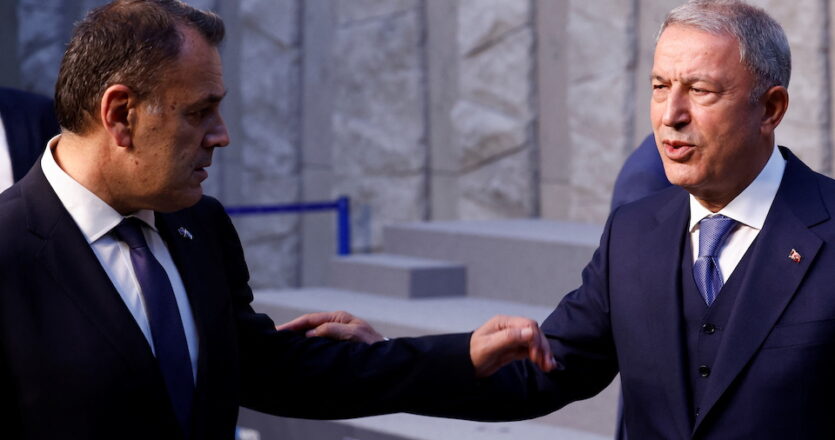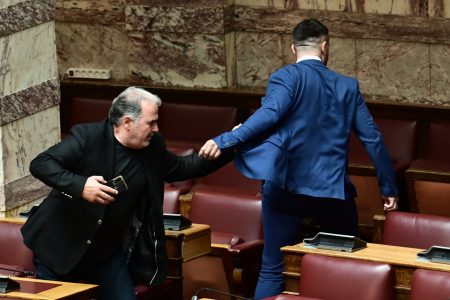By George Gilson
In the first indication that Greek-Turkish talks may be in the offing after Turkish President Recep Tayyip Erdogan’s repeated invective against PM Kyriakos Mitsotakis and his angry announcement that he is cutting off channels of communications with him and Greece more generally, Defence Minister Nikos Panagiotopoulos and his Turkish counterpart, Hulusi Akar, spoke briefly today on the margins of a NATO defence ministers’ meeting in Brussels and reportedly intend to arrange an official meeting.
The development comes after Akar – following Ankara’s almost daily challenges of Greece’s sovereignty over dozens of Aegean islands on grounds that the Greek foreign ministry debunked with the release of 16 maps demonstrating Ankara’s growing expansionism from the 1923 status quo established by the Treaty of Lausanne to maps issued this year with islands that Turkey insists should be stripped of their defences – indicated that he is prepared to begin talks with his Greek counterpart.
According to Turkish defence ministry sources quoted by the daily Kathimerini, the two ministers agreed on the need to maintain open channels of communication to resolve day-today problems and to focus on a positive agenda that will bolster good neighbourly relations and promote a dialogue to reducde tensions.
Those leaked niceties, however, in no way reflect Ankara’s posture on the ground and its diplomatic moves, such as the recent letter to UN Secretary-General Antonio Guterres that demands demilitarisation of the Greek islands of the Eastern Aegean.
Ankara prepared to begin talks immediately
Some days before today’s summit, Akar expressed to the same daily Ankara’s willingness to resume bilateral talks on both the diplomatic and on the military-to-military level.
“We are ready to resolve all our problems through talks and meetings. Many efforts have already been made. There are the exploratory [diplomatic] talks that we would like to complete. There are confidence-building-measures and meetings in the NATO framework,” Akar said.
“We are ready to immediately begin these meetings, just as we are ready to meet and talk with our Greek counterparts. If there is an opportunity when we go to Brussels, I am prepared to meet with Nikos,” he added, cordially paving the way for today’s brief encounter with Panagiotopoulos.
What issues will Turkey pile up on the agenda?
If exploratory and confidence-building-measures resume where they left off, then Ankara’s latest challenges to Greece’s sovereignty over its Eastern Aegean islands (based on the fact that defensive forces are deployed there to protect against an invasion by Turkey’s Aegean Army) will be put off until a second phase, but Ankara is certain to raise them and push hard with what appears to be an extremely bellicose bargaining chip, that may well be designed to exact Greek concessions in its Exclusive Economic Zone [EEZ] in the hydrocarbons-rich Eastern Mediterranean.
The pro-government Turkish press has in recent days published front page banner headlines claiming that Greece is occupying Turkish island. Whatever is left of the opposition press has been focusing on the country’s dire economic straits.
The Turkish maps released by the Greek foreign ministry illustrate: illegal licensing by the Turkish Petroleum Company (TPAO) that began in 1973 in Greece’s continental shelf in the Northern Aegean, the effort in the 1980’s to grab Athens’ search-and-rescue authority in half of the Aegean, the theory of “grey zones” in the 1990’s [Aegean islands which Turkey claims to be of indeterminate sovereignty, such as the Greek Imia islets that brought the two countries to the brink of war and triggered a US-brokered deal that neither would approach them, effectively stripping Greece of its sovereign rights], escalation with new Turkish licensing in the Eastern Mediterranean, the more recent establishment of the official Blue Homeland doctrine that cuts into large swathes of Greece’s maritime jurisdiction (as does the illegal Turkey-Libya memorandum, putatively delimiting the two countries’ EEZs, which are in fact not contiguous), and the demand for demilitarisation of specific Greek islands, which Ankara now proclaims is a precondition for Athens to maintain sovereignty over them, otherwise they will revert to Turkey as the successor state of the Ottoman Empire.
Effectively, Ankara is issuing an ultimatum and suggesting that if it is not heeded it has the right to occupy the islands.
The Greek foreign ministry, however, has for reasons unknown not released its own maps to counter Turkey’s by delineating its sovereign territory and continental shelf in the Aegean and its EEZ in the Eastern Mediterranean.
It also remains uncertain whether the two sides intend to refer specific issues and questions to the International Court of Justice at the Hague – the two sides must agree on the issues and their parameters by signing an agreement called a compromis – and if so which those would be, given the fact that a large number of Turkish claims, including «grey zones» and the demilitarisation of Aegean islands, would never be agreed to by Greece.
Panagiotopoulos sets de-escalation as precondition for talks
Defence ministry sources say that Panagiotopoulos will set de-esacaltion of Turkish provocations in the Aegean (flights over inhabited Greek islands and a hair’s breadth from the port city of Alexandroupolis, the latter in protest over a new US base there and the planned floating LNG terminal – with four LNG storage tanks with a total capacity of up to 153,500 cubic metres and three regasification units, each with a regasification capacity of 315.000 cubic metres.





